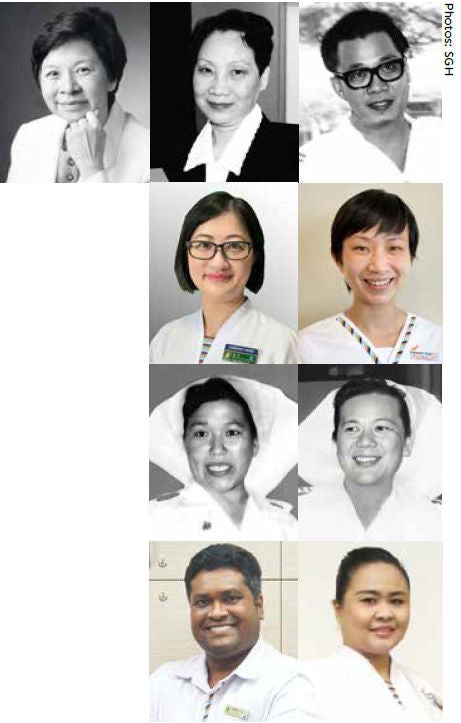
(Clockwise from top left) Ms Sylvia Cheang, Director, Nursing (1984-2002); Ms Kwok Moon Hoe, Operating Theatre Manager (1996-2003); Mr Bernard Soo, Principal Nursing Officer (1981-1984); Ms Esther Monica Fan, Nurse Clinician, Nursing Innovation and Transformation; Ms Ti Sui Tsu, SGH Matron (1961-1970); Ms Jumaiah Jumari, Nurse Educator, Institute of Advanced Nursing; Mr Shashi Chandra Segaram, Nurse Clinician, Emergency Medicine; Ms Lim Kwee Neo, SGH Matron (1958-1961); and Ms Xu Yi, Senior Nurse Clinician (Community Nurse).
Today’s nurses look after patients, administer specialised treatments, teach nursing skills, undertake research, and organise large projects to improve care.
Just as the first doctors landed in Singapore at the same time as Sir Stamford Raffles, so did nurses. Those “first” nurses were recruited from local jails and were mostly men, as women in the 19th century did not visit hospitals. They gave birth and had ailments treated at home instead.
Even after women started visiting the hospitals, the people tending to them were mostly untrained, as the profession advanced slowly in the early years. The first trained nurses who started working in the General Hospital on 1 August 1885 were nuns, and it was only on 5 May 1900 that four trained nurses from the UK replaced them to mark the start of nursing as a profession in Singapore.
Nursing has come a long way since. Today’s nurses are highly trained and skilled professionals who specialise not just in patient care, but in areas such as burn injuries, cancers and post-surgery
care. They have clear career paths that allow them to work towards the top of their profession in care, research or education. Training is available at ITE College East and Nanyang Polytechnic’s School of
Health Sciences; the latter offers a nursing diploma. In recent years, many aspiring nurses have attained a first degree at various universities locally and abroad.
SGH has 38 Advanced Practice Nurses (APNs) and 332 Nurse Clinicians (NCs), including Nurse Educators. They are experts in their field, working alongside doctors and other healthcare professionals to provide complex nursing care. They take on some clinical work in assessing and managing conditions, and administering treatments in their own clinics. They specialise in areas relating to pelvic floor conditions, post-vascular and orthopaedic surgery, post-stroke management, and breast cancer care.
Many stand shoulder to shoulder with medical professionals. Not only are they skilled nurses, they teach and mentor younger colleagues, and are involved in research.
Dr Lim Su Fee, a rehabilitation care APN and President’s Nurse (2015), is a published researcher and lecturer. She started a new community nursing initiative with a large team of acute care-trained nurses to care for the elderly in Singapore’s south-east region.
Other notable APNs and published researchers include Dr Juriyah Yatim, who runs SGH’s Pelvic Floor Disorder Service; and Dr Aline Teh who runs the Pre-Anaesthesia Evaluation Clinic, trains Master of Nursing students, and leads the APN internship programme.
Testament to SGH’s professional nursing standards, the hospital boasts 13 President’s Award for Nurses recipients since its inception in 2000. Ms Saraswathi Nagalingam, the first SGH nurse to receive the award in 2001, was also Singapore’s first Breast Care Nurse Clinician in 1992. She is most respected for her work with breast cancer patients and for starting breast cancer support groups.
Increasingly, nurses are entering service armed with postgraduate degrees. Ms Ang Shin Yuh, a President’s Award for Nurses recipient in 2019, won a government scholarship to study nursing overseas. She later pursued postgraduate business studies in healthcare management. With an innovative spirit, she develops devices and improves techniques to better care for patients and improve the well-being of fellow nurses.
This is the last in this SGH200 column, but the celebrations can be followed at www.sgh.com.sg/sgh200 and on our social media platforms: Facebook (@SingaporeGeneralHospital), Instagram (@sghseen) and TikTok (@sghseen).













 Get it on Google Play
Get it on Google Play